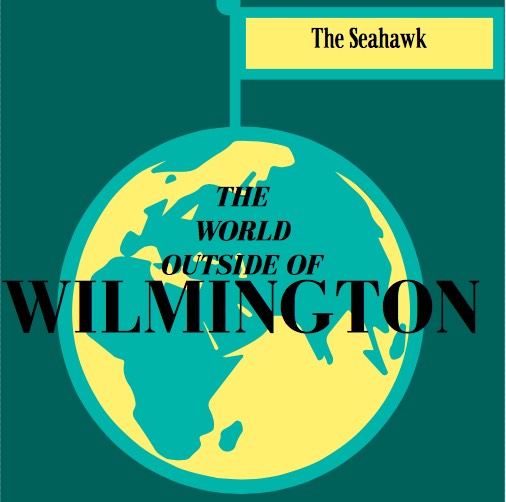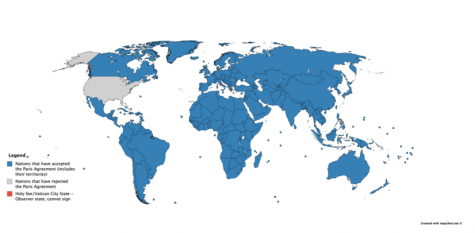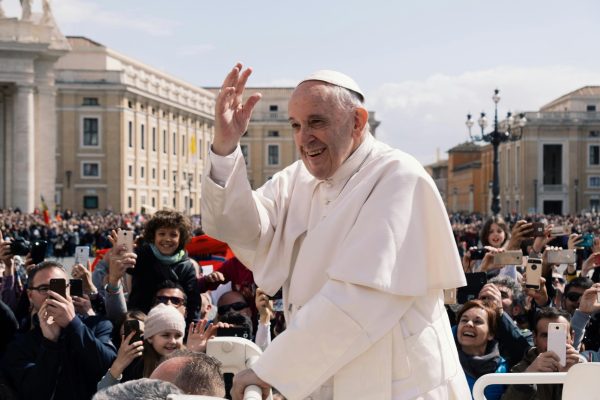Weekly update: News from the World Outside Wilmington
The Paradise Papers, North Korea, Saudi Arabian ballistic missiles and royal arrests, Madagascan plague, climate change and more in this week’s international news update

This article is one out of a weekly series by staff writer Tyler Newman titled World Outside Wilmington, which summarizes major events in international news.
The Paradise Papers
A massive new release from the International Consortium of Investigative Journalists (ICIJ) have revealed 13.4 million documents related mostly to the tax havens utilized by the global elite.
The papers, originally obtained by German newspaper Süddeutsche Zeitung, were then relayed to the ICIJ and distributed to the public. Over 100 media groups are currently investigating the papers.
Süddeutsche Zeitung and the ICIJ were also responsible for releasing the Panama Papers last year – which exposed the financial information for numerous wealthy individuals around the globe – as well as detailing information on more than 214,488 offshore entities.
Among those exposed so far by the Paradise Papers include Queen Elizabeth II, U.S. Secretary of Commerce Wilbur Ross and U.S. Secretary of State Rex Tillerson, aides to Canadian Prime Minister Justin Trudeau, multiple former Prime Ministers of Canada and Apple Inc.
In 2005, Queen Elizabeth II’s private estate and portfolio, the Duchy of Lancaster, invested $7.5 million in Dover Street VI Cayman Fund LP, according to files from the offshore law firm Appleby.
The Cayman fund also invested in a private equity company that controlled BrightHouse, a U.K. rent-to-own firm that has been criticized for selling household goods to disadvantaged Britons on payment plans with annual interest rates as high as 99.9 percent.
Elsewhere, Apple, Inc. has found a way to evade shut down tax loopholes in America and keep tax rates ultra-low. Those low tax rates have allowed the tech giant to accumulate $252 billion of offshore cash on the Channel Island of Jersey, a Crown dependency of the United Kingdom.
Other benefactors include powerful British businessman and politician Lord Ashcroft, Nike, Inc. and Twitter and Facebook, who both received hundreds of millions of dollars in investments that can be traced back to Russian state financial institutions.
These are just brief details of some of the figures involved in the leak. The 13.4 million papers are far from being completely sorted through. Many more influential and high-ranking individuals from around the world are expected to show up somewhere among the Paradise Papers.
Further investigation into the Paradise Papers is ongoing. For more details, visit https://www.icij.org/investigations/paradise-papers/
North Korea at the forefront as Trump visits Asia
U.S. President Donald Trump issued new rhetoric to the North Korean regime during a visit to Tokyo, Japan as part of his first Asian trip.
While at a news conference with Japanese Prime Minister Shinzō Abe, Trump warned that North Korean missiles will be shot out of the sky if the Japanese buy arms from America.
This comes just days after a collapsed tunnel incident at a nuclear test facility in North Korea left nearly 200 dead, all while the Kim Jong-Un regime has stayed relatively silent.
On Monday night, Trump arrived in Seoul, South Korea, which is just 35 miles south of the border with North Korea and only 120 miles from Pyongyang. Receiving mixed reactions from South Koreans upon his arrival, Trump spoke with South Korean President Moon Jae-in on the topic of North Korea.
Just off the coast of the Koreas are three U.S. aircraft carriers and a nuclear submarine, as reported by CNN and other news outlets. Many hope that they are never put to use in the region.
Talk drifts through the streets of Seoul that a conflict may once again erupt between North and South Korea, and Trump’s address on Nov. 7 was primarily aimed at North Korea.
“The more successful South Korea becomes, the more decisively you discredit the dark fantasy at the heart of the Kim regime,” Trump said in his address. He also called North Korea a “country ruled as a cult,” and urged all nations to isolate North Korea’s “brutal regime.”
On Nov. 8, Trump is expected to land in Beijing and stay until Nov. 10, when he will travel southwards to Vietnam. His final leg of the Asian trip will be two days in the Philippines, from Nov. 12 to Nov. 14. Trump is expected to meet with the presidents of each of the three nations.
Saudi Arabia – Ballistic Missiles and Royal Arrests
On Saturday, a ballistic missile was intercepted over an airport in Riyadh, the capital city of Saudi Arabia.
Fired by Yemeni rebels using a long-range missile known as the Burqan 2H, the missile was intercepted and destroyed by the Patriot missile defense system. Debris landed near King Khalid International Airport in an uninhabited area.
No injuries were reported during the missile interception, which occurred around 8:07 p.m. local time (1:07 p.m. ET).
The airport later tweeted: “Travelers across King Khalid international airport in Riyadh, we assure you that the movement is going on as normal and usual, and trips going according to time.”
The missile interception is just one of many pieces of news that has been emerging from Saudi Arabia over the past week.
On Saturday, Crown Prince Mohammed bin Salman ordered the arrests of dozens of highly influential figures in the nation, including 11 of his royal cousins.
One of those cousins, Prince Alwaleed bin Talal, is a prominent billionaire investor in companies such as Twitter, Lyft, Citigroup and 21st Century Fox. Talal has also done business with Bill Gates, Rupert Murdoch and Michael Bloomberg, according to CNBC.
Prince Mutaib bin Abdullah, who was also arrested, was the most potent remaining rival to the crown of Saudi Arabia.
The arrests were seen by some as a consolidation of power by the crown prince himself in what was purported as anti-corruption arrests.
Others that were arrested included military officers, influential businessmen and government ministers.
United States vs. the world on Paris Agreement

On Tuesday, Syria signed the Paris Climate Agreement, leaving only the United States as the sole nation on Earth that has rejected the Agreement.
President Donald Trump decided to pull the U.S. out of the Agreement on June 1, drawing controversy from many, including heads of state, corporate executives and even members of Trump’s own staff.
However, some of Trump’s staff praised the move, including former White House chief strategist Stephen K. Bannon and Environmental Protection Agency Administrator Scott Pruitt.
The only two countries at the time that were not in the Paris Agreement were Nicaragua and Syria. Nicaragua’s reasoning was that the Agreement was not strict enough, and Syria’s was the civil war raging across the nation.
But both nations have seemed to change their minds as of Nov. 7, with Nicaragua joining in October and Syria signing on Tuesday.
The primary goal of the Paris Agreement is to keep global temperature rise in the 21st century well below 2 degrees Celsius above pre-industrial levels and to pursue efforts to limit the temperature increase even further to 1.5 degrees Celsius.
President Trump has made no comment on the matter.
More on Climate Change can be found in the final section of this article.
Plague epidemic sweeps Madagascar, threatens African continent
124 people have been killed in Madagascar since August due to an outbreak of the plague.
The plague is commonly endemic to the island nation, however with 1,192 cases reported since August, it is beginning to cause some worry. The outbreak has started earlier in the season than usual and has struck urban areas rather than rural areas.
Two thirds of the reported cases are of pneumonic plague, which is known to be the deadliest form of the disease.
Israel has dispatched aid to the country, which is expected to arrive in the coming days. The plague has spread by 37 percent in just five days, according to official figures released last week.
The World Bank has released an extra $5 million to Madagascar to help combat the spreading plague.
The two largest cities on the island, Antananarivo (the capital) and Toasmina, have reported 55 percent of all cases.
The outbreak is being reported as the worst in 50 years and has reached “crisis” point. Because of this, the World Health Organization has placed nine African nations on high alert including South Africa, Seychelles, La Reunion, Mozambique, Tanzania, Kenya, Ethiopia, Comoros and Mauritius.
If the current trend continues, the epidemic could strike up to 20,000 more in just a matter of weeks.
This situation is currently ongoing.
2017 poised to be hottest year on record that is not El Nino
At the annual United Nations climate change talk, held in Bonn, Germany, the World Meteorological Organization declared 2017’s average global temperature from January to September to be 1.1 degrees Celsius above the pre-industrial era.
The WMO also predicted 2017 to be the hottest year on record that is not El Nino.
El Nino is usually used to explain rising temperatures and sometimes even suggest that temperatures are not warming at all. The fact that 2017 is predicted to be hottest year without El Nino has come as a shock to many.
While not expected to overtake 2016 as the hottest year on record, 2017 is expected to join 2015 as the second or third hottest year.
This would mean that the years 2013 to 2017 are likely to be the hottest five-year period on record.
Arctic sea ice was well below average throughout 2017, including record-low levels for the first four months of the year. Sea ice cover in Antarctica also hit record lows which could be attributed to ocean temperature. The ocean temperature in 2017 is on track to be among the three highest on record.
“We have witnessed extraordinary weather, including temperatures topping 50C (122F) in Asia, record-breaking hurricanes in rapid succession in the Caribbean and Atlantic reaching as far as Ireland, devastating monsoon flooding affecting many millions of people and a relentless drought in East Africa,” said Petteri Taalas, WMO secretary-general.
Wildfires have also devastated parts of Chile, Portugal and the United States, landslides afflicted Sierra Leone, flooding struck parts of the Indian subcontinent and record temperatures were recorded in Italy.
“Many of these events – and detailed scientific studies will determine exactly how many – bear the tell-tale sign of climate change caused by increased greenhouse gas concentrations from human activities.”
The United Nations recently warned that there is a “catastrophic” gap between what needs to be done on climate change and what governments and companies are actually doing.
This situation is currently ongoing.










